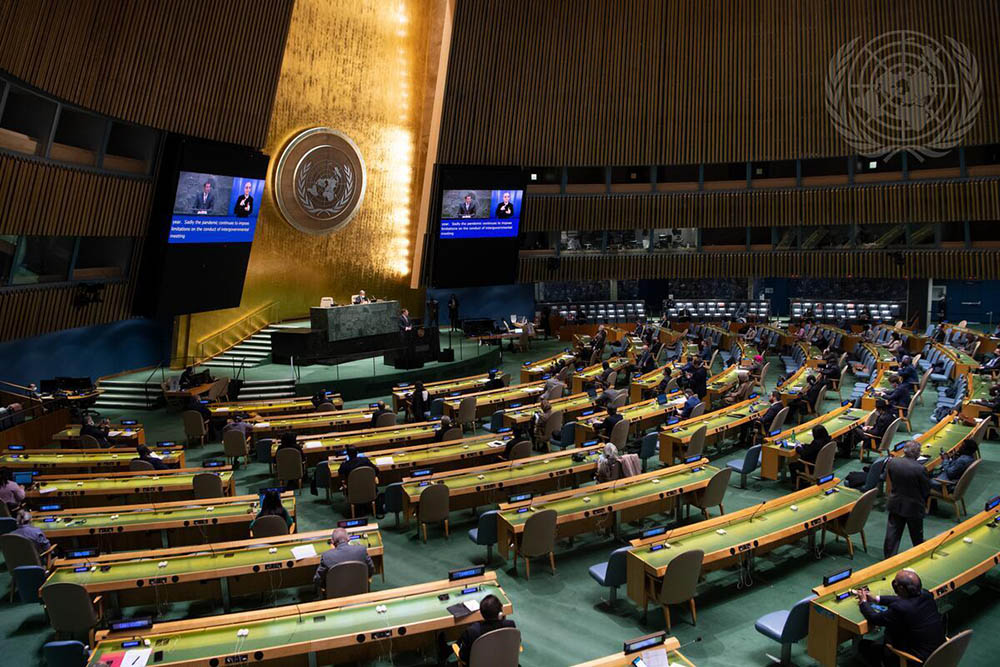People march together holding banners and placards on International Women's Day on March 8, 2021, in Manila, Philippines. (CNS/Reuters/Lisa Marie David)
Editor's note: Global Sisters Report's new blog, Monday Starter, is a weekly feature from GSR staff writers that rounds up news from or about women religious that you may otherwise have missed.

In other coverage of the 65th session of the U.N. Commission on the Status of Women, I wrote that the meetings were, to my eyes, pretty somber. Why? One fact came through: This last year has been terrible for women and girls.
It's well-known that the pandemic lockdowns have increased domestic violence against women, prompting a campaign by UN Women to highlight what the organization calls "the Shadow Pandemic."
And since the coronavirus pandemic began in March 2020, U.N. Secretary-General António Guterres has repeatedly drawn attention to the problem, saying in the first months of the pandemic, "Women's rights and freedoms are essential to strong, resilient societies. Together, we can and must prevent violence everywhere, from war zones to people's homes, as we work to beat COVID-19."
But it is worth noting that the issue of domestic violence came up again and again during the March 15-26 Commission on the Status of Women meetings.
I mentioned in coverage of a March 18 webinar on homelessness sponsored by UNANIMA International that domestic violence is often a driver for women and girls becoming homeless. A March 15 event, sponsored by several sisters' congregations and ministries, including the Mercy International Association, confirmed that dynamic across the world.
"The most significant contributor to rates of homelessness in [the Australian state of] Victoria is women and children leaving family violence," said Jocelyn Bignold, CEO of McAuley Community Services for Women, a ministry of the Institute of Sisters of Mercy of Australia and Papua New Guinea.
Similar dynamics exist in neighboring countries. The scale of domestic violence in Papua New Guinea is considerable, Mercy Sr. Theresia Tina said at the March 15 event. She said (as has Human Rights Watch) that as many as 6 out of 10 women and girls in that country experience some kind of violence, verbal or physical, daily, a fact stemming from a male-dominated culture in which women "have no say."

The U.N.'s General Assembly during the March 15, 2021, opening session of the U.N.'s 65th Commission on the Status of Women (Courtesy of the United Nations)
"Women and girls have no voice," Tina said. "Women are culturally meant only for child-bearing and home management. Women have [virtually] no part in decision-making."
While there is growing public dissension about these attitudes, some better laws on the books and more shelters and safe houses for women, change is still slow, Tina said: "Many women are still afraid to speak out."
Speaking out is necessary as a "collective step forward," Bignold said during the webinar. In doing that, she said, "we are, at least, bringing [the problems] out in the open and acknowledging their existence."
It is also important to talk about the need to chip away at patriarchal systems that are harming all people, all genders and even Earth itself, said Mercy Sr. Ana Siufi, an Argentina-based justice advocate for the Sisters of Mercy of the Americas.
She said environmental damage caused by mining and other extractive industries is one example of patriarchy, with violence against women — including an increase in femicides in Argentina in the last year — as another.
"Like the social fabric, the environmental fabric is being destroyed," she said. "These are not accidents."
Other events during the Commission on the Status of Women meetings highlighted broader concerns.
A March 25 webinar sponsored by the Georgetown Institute for Women, Peace and Security was not directly tied to the Commission on the Status of Women meetings but touched on concerns of women's empowerment, particularly worries that progress on gender equality is threatened.
Webinar participants noted that gains made by women in recent decades are now under threat from fundamentalist groups, conservative populist movements and authoritarian governments. As one example, Turkey announced in March it was withdrawing from a Council of Europe convention on protection for women that had been drawn up, tellingly, in Istanbul in 2012.
"The backlash [against women] seems to grow by the day," said Melanne Verveer,
executive director of the Georgetown institute, and that is prompting renewed activism by female activists to reclaim rights and defend progress.
At its core, this "pushback to the pushback" is based on a vision of a better world in which, at a very minimum, women and girls will experience security, not violence, in their homes.
"We need to dream that another world is possible," Siufi said.
Advertisement
Sr. Norma Pimentel faces the nation about the US-Mexico border
Missionary of Jesus Sr. Norma Pimentel, executive director of the Catholic Charities of the Rio Grande Valley, appeared on CBS's "Face the Nation" on Easter Sunday and discussed the situation on the U.S.-Mexico border.
In the April 4 interview with CBS's Margaret Brennan, Pimentel said what is happening now "is what we've seen already for several years back, surges of families arriving to our border that leave their country because what's happening in their country has not changed."
In addition to emphasizing the need for policies that get at the root cause of people migrating, Pimentel also discussed the response of Catholic Charities and others to current challenges. She also recently talked about the situation with Global Sisters Report.
Young unaccompanied migrants ages 3 to 9 watch television inside a playpen March 30, 2021, at a holding facility in Donna, Texas, set up in February by U.S. Customs and Border Protection, an agency within the Department of Homeland Security. (CNS/Pool via Reuters/Dario Lopez-Mills)
Human Rights Campaign features sister advocate for transgender community
Also on Easter Sunday, the Human Rights Campaign ran an advocacy campaign spot featuring Sr. Luisa Derouen, a member of the Dominican Sisters of Peace, who has been ministering to members of the transgender community since 1999.
In the video, Derouen, who has written several times of her ministry for GSR, most recently in January, says to members of the transgender community, "When I see you, I see God looking at me with love." She also recounts how up until 2018, she did not use her name publicly in discussing her ministry.
"When I see you, I see God looking at me with love."
As we celebrate #Easter, Sister Luisa Derouen reminds transgender folks of our goodness and our beauty and that we deserve to be treated with dignity and respect. pic.twitter.com/DGvQjfI4pb— Human Rights Campaign (@HRC) April 4, 2021






